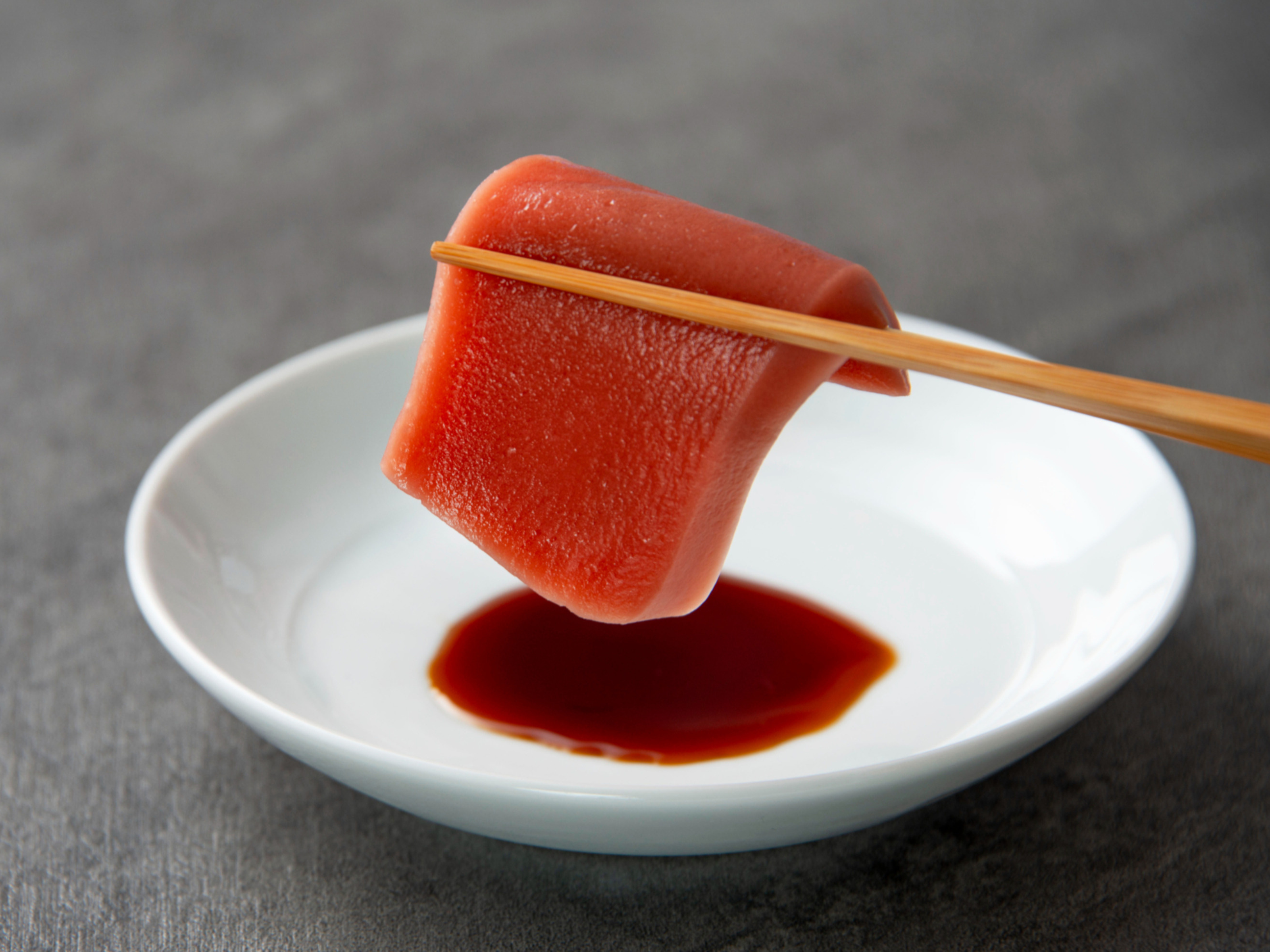
Japan’s Mitsui DM Sugar will launch a new brand of vegan tuna next year to tackle the rising costs of the fish and declining seafood production.
The world’s largest tuna consumer is facing supply challenges, and one food giant is betting on plants to save the day.
Mitsui DM Sugar, a producer of sugars and functional foods, will target the challenges of low seafood production and high costs with a new plant-based brand of tuna, as reported by Nikkei Asia.
Set to launch next year, the Osakana Kakumei (or ‘Fish Revolution’) brand replicates maguro, or bluefin tuna, the most prized form of the fish. The product has been developed by Mitsui DM Sugar subsidiary Taisho Technos, a food additive specialist whose tech has helped replicate the texture and appearance of tuna.
A plant-based fish cheaper than tuna

Bluefin tuna is a highly sought-after seafood delicacy, thanks to its velvety texture, buttery flavour and nutritional attributes. The species is the ocean’s fastest and longest-distance swimmers, which makes them difficult to raise in captivity, thus commanding a higher price and their use in high-grade sushi and sashimi.
This also means the tuna’s supply is limited and extremely variable in quality, and its stocks face declines due to overfishing and illegal, unregulated and unreported fishing.
Continued demand is driving the species towards endangerment and has prompted governments to place strict quotas to limit its fishing. Plus, tuna is one of the most polluted fish in the oceans, often contaminated with plastic debris and extremely high levels of heavy metals like mercury.
Some companies, like WandaFish and BlueNalu, are taking the cultivated meat route to solve this problem, whereas Mitsui DM Sugar is betting on a more established technology to keep costs low.
Its tuna alternative is made from konjac, seaweed and bamboo fibre, echoing the fish-free seafood options traditionally found in Asian markets. It contains 6g of fibre per 100g, and can be used in sashimi or as part of other delicacies.
The USP lies in the price tag. Mitsui DM Sugar’s plant-based tuna will cost ¥2,000 ($13.50) per kg, undercutting the wholesale price of conventional tuna at Tokyo’s Toyosu fish market, which stood at ¥3,262 ($22) per kg last month, according to Nikkei Asia.
“We seek to foster [Osakana Kakumei] into a food that is as beloved as imitation crab meat,” a Mitsui DM Sugar representative told the publication.
How Mitsui DM Sugar is setting itself up for success

The impending launch of the vegan bluefin tuna comes after Japan’s seafood production fell by 20% in the previous decade, with the number of fishers down even further by 30%.
Other local companies, like Azuma Foods and NH Foods, make vegan seafood with konjac flour too, though they’re currently too expensive to be adopted on a mass scale. For example, Azuma’s product is priced at ¥990 ($6.67) per 230g, equating to $29 per kg.
Low manufacturing volumes drive higher prices for plant-based alternatives, and while investment boomed at the turn of the century to help scale up production and enable widespread adoption, funding has fallen off a cliff in the years since. Last year, global investment in plant-based companies declined by 64%.
Established manufacturers like Mitsui DM Sugar have a competitive advantage, given their preexisting large-scale supply chain. The company said it expects to produce 10 tonnes of the Osakana Kakumei tuna every year starting in 2028.
Another strategy to overcome the plant-based slump is to market the tuna alternative to a specific set of consumers who can’t eat sashimi. Think: patients in nursing homes, where raw foods like sashimi are rarely served due to the risk of poisoning, as well as pregnant women and hospitals.
While promoting the product as ‘plant-based’ is one option, one official said: “We decided to focus on the fact that there is a surprisingly large number of people who want to eat sashimi but can’t.”
As it prepares for the tuna’s launch in 2026, Mitsui DM Sugar will also explore developing products containing nutrients other than just dietary fibre, and plant-based versions of other seafood options, like salmon or squid.
The post Japanese Food Giant Addresses Soaring Tuna Prices with Cheaper Plant-Based Alternative appeared first on Green Queen.
This post was originally published on Green Queen.